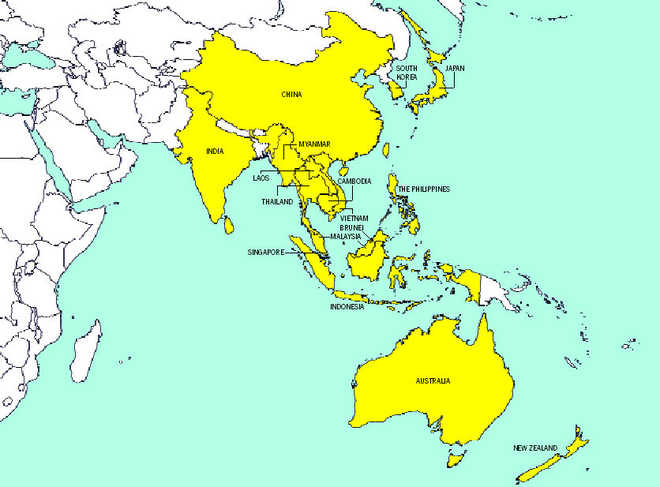
Regional Comprehensive Economic Partnership or RCEP is a proposed free trade agreement (FTA) between the 10 member states of ASEAN and its six FTA partners: China, Japan, India, South Korea, Australia and New Zealand
Sandeep Dikshit in New Delhi
Tomorrow it will become clear whether India will sign its 11th, largest and most controversial free trade agreement (FTA) with a wide swath of 15 other countries from the Asia Pacific. If the entry of India in G-20 marked the delinking of Pakistan in the economic sphere, the Regional Comprehensive Economic Partnership (RCEP) agreement will be India’s doorway to the global neo-liberal troposphere, where it will share the same trading norms and space as China, Japan, Singapore, Australia and Malaysia, although there are laggards like Myanmar and Laos as well.
Also read:
- Why Sangh affiliate’s opposition suits BJP
- Small, medium units in panic
- ‘Fears of milk products, seeds being dumped’
- ‘Agriculture must be kept out of FTA’
- The pact would be suicidal: Jairam
- What can happen
- AT CROSSROADS: How crucial sectors fear they would fare if deal is on
But far from the smooth affair it was portended to be when Prime Minister Narendra Modi shared the stage with 10 ASEAN members in New Delhi last year, its signing has turned into a cliffhanger. The RCEP has become the first test of the tension between Modi’s domestic constituency and his projection outside of a more aggressive, risk-taking ‘New India’. An India that twice knocked Pakistan militarily on the knuckles has no reluctance about breaking bread with Russia and Ukraine; Iran and Israel cannot be expected to tuck in its tail on a mere trade agreement.
But PM Modi can ill-afford to overlook the growing foreboding about a new unknown once RCEP is signed. The fears of being taken unawares are accentuated by past experience. The State has rarely reduced the affected sector’s adjustment costs by informing it about the transition well in time. From Modi downwards, the top leaders cannot assuage the fears explicitly because the negotiations are secret. Though leaks have made it clear where the intrusions in India’s ecosphere will take place, the secretiveness enables fear mongers to project more widespread damage if India signs the RCEP.
At the same time, the threat to livelihood cannot remain an indefinite excuse to stave off integration with global supply chains, the de rigueur of the upper end of the economic world.
The dairy sector in India, where some of the fears lie, is both big and small. Besides single-animal-owning households, there are several dairy-to-builder conglomerates and well-appointed state-funded cooperatives that shelter behind the argument of threat to livelihood. Why is it that NDDB and state cooperatives from Verka to Mother Dairy fear getting swamped by similar farmer cooperatives from New Zealand? The government can manage dumping of milk from New Zealand at artificially low prices, which it may well do as it produces eight times above its national requirement. But if the government manages to get RCEP agree to delay the tariff reduction, the cooperatives will not have any excuse to get their act together.
The theory that India has problems with non-FTA countries gets a knocking when it comes to Japan and South Korea. Both are insisting on tougher norms that will affect India’s pharma industry and data localisation.
Several flags are being raised about the advantages gained by the other party in India’s previous FTAs, the one with ASEAN being a case in point. They overlook the advantage to the consumer from a better quality or cheaper product from abroad but also more crucially that the services component where India is at an advantage was added recently. And it awaits implementation because the Philippines hasn’t ratified the FTA in services as it fears direct competition from India. This tactic by Manila could open the way for India to adopt a similar recourse if its voice goes unheeded in its areas of advantage.
Japan and South Korea have led the charge against the easier movement of people. They are insisting on “Mode 3” type of migration, which means easier visa norms for commercial persons whereas India’s interest is served by “Mode 4 plus” that will benefit its IT personnel.
The Indian textile sector is also under threat from Southeast Asian nations like Vietnam.
WTO is on life support
The all-round American effort to undermine the World Trade Organisation has convinced New Delhi that the builder of the edifice is not interested in the structure anymore. As the stalemate in multilateral trading system persists, there can be no turning back from the criticality of FTAs in foreign trade policy.
This is also an opportunity for India to seek integration into the global supply chains, which course through the exporting powerhouses that form the RCEP. Its own industries too will reduce the transaction cost of negotiating multi-layered regulatory procedures in several countries.
But never were such fears generated when India signed 10 FTAs and six preferential trading arrangements (PTAs) in the past. This is because the elephant in the room is China. It already has a massive trade surplus with India which will grow if China bounces its products to India via the other RCEP countries.
The best case scenario for India while it works out a tilt in its favour in the services sector and ensures tight value addition norms to prevent China from masking its exports is delaying RCEP, just as its signing was put off the same time last year.
But is it possible to stay out of RCEP? India has both security and economic ties with most RCEP countries. Since India will continue to have the Indian Ocean’s largest navy, individual countries will happily deal with India on the security front. The Quad comprising India, Australia, Japan and US too will continue. But a big hole would have been blown in India’s argument that it is participating in the Quad for the economic development of Indo-Pacific region.
Is the opposition for real?
The Congress opposition is tactical and opportunistic, aimed at reaping the whirlwind of rural distress for political gain. Except for the Left, all shades of political opinion were complicit in giving wind to the RCEP sail. Negotiations for the India-ASEAN FTA, the forerunner of RCEP, began during Vajpayee’s government. They were finalised by UPA and expanded by the present dispensation.
Modi will have to countenance the erosion in rural support as he can ill-afford to send signals that he is averse to FTAs. He also risks the loss of political capital abroad if he pulls out of RCEP. After bestowing $1 billion for the Russian Far East, serenading Fortune 500 CEOs in the US and cutting corporate taxes, Modi’s predatory trade and investment instincts can ill-afford to turn vegetarian.


























